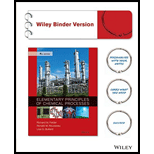
Concept explainers
(a)
Interpretation:
Plot a calibration curve using given data.
Concept introduction:
100 g of pure water and different weighed quantities of amino acid L-isoleucine (Ile) were added to six flasks to prepare aqueous solutions. Then the densities of solutions were measured using densitometer, with the following results.
| r (g Ile/100 g H2 O) | 0 | 0.8821 | 1.7683 | 2.6412 | 3.4093 | 4.2064 |
| Ρ (g solution /cm3) | 0.98803 | 0.98984 | 0.99148 | 0.99297 | 0.99439 | 0.9958 |
A calibration curve,
(b)
Interpretation:
Using the calibration curve calculate the mass flow rate of the given stream.
Concept introduction:
100 g of pure water and different weighed quantities of amino acid L-isoleucine (Ile) were added to six flasks to prepare aqueous solutions. Then the densities of solutions were measured using densitometer. Using observed data, a calibration curve was drawn and given by the formula,
Where, Ρ = density and r = concentration
In addition, it is given as,
Density = 0.994 g / cm3, Volumetric flow rate = 150 L/h
(c)
Interpretation:
If the thermocouple is poorly calibrated. Would the mass flowrate estimated in section (b) be too high or too low?
Concept introduction:
100 g of pure water and different weighed quantities of amino acid L-isoleucine (Ile) were added to six flasks to prepare aqueous solutions. Then the densities of solutions were measured using densitometer. Using observed data, a calibration curve was drawn and given by the formula,
Where, Ρ = density and r = concentration
Want to see the full answer?
Check out a sample textbook solution
Chapter 3 Solutions
Elementary Principles of Chemical Processes, Binder Ready Version
- Solve this questionarrow_forwardthe answer is shown but i dont know how to get to itarrow_forward1. (20 points) Steam (6000 kg/h, 10 bar, 400°C) is passed through an adiabatic turbine that drives a shaft to generate power. The steam leaving the turbine is at 0.5 bar and passes to a chiller where heat is removed at the rate of 1.25 x 107 kJ/h. Saturated liquid leaves the chiller at 0.5 bar. (a) How much work (kW) is produced in the turbine? (b) What is the quality of steam leaving the turbine? Sometimes, steam produced is 'wet' in nature, and is composed of saturated water vapor and entrained water droplets. In such cases, quality is defined as the fraction of steam that is vapor.arrow_forward
- WLV2 | Online teaching and × + w.com/ilrn/takeAssignment/takeCovalentActivity.do?locator-assignment-take A १ eq eq eq [Review Topics] [Referen Draw the structure of 3,3-dimethylbutanal in the window below. • In cases where there is more than one answer, just draw one. 985 + / $ Sn [ ] ChemDoodle ? req Submit Answer Retry Entire Group 8 more group attempts remaining req req Cengage Learning Cengage Technical Supportarrow_forwardA flat-sheet membrane of thickness, L, and surface area, S, separates two fluids (see figure). The concentration on the upstream side is maintained at C_A0 while that on the downstream side is maintained at zero. The membrane is loaded with an immobilized enzyme that converts substrate A to product B according to a zero order reaction mechanism given by:R_A=-k_0"' (d) What is the flux, N_A, at the downstream surface (z=L)? (e) Under what condition will the flux at z=L be equal to zero? (f) At the condition in (e), what can you say about the diffusion time relative to the reaction time?arrow_forwardDevelop a purification train for a facility where first process is a perfusion upstream bioreactors 500L producing low cell culture titer of approx. 0.5 g/L perfusing at 2 VVD over 30 days. The current facility has a secondary clarification process for the perfusate coming from the bioreactor. Secondary depth filtration clarification capacity of 200 L/m2. Identify the correct filter area, and system (pump) requirements for the process scale. Also identify optimal flowrates for flushing and processing, total process time, buffer volumes required. Assume 10 L/m2 holdup of the depth filters identify the size of the tank required to collect the filtrate. Average yield of overall clarification is 80% estimate the titer in the clarified pool.arrow_forward
- Bioprocessing/ Protein isolation and purification. Develop a purification train for a facility where first process is a perfusion upstream bioreactors 500L producing low cell culture titer of approx. 0.5 g/L perfusing at 2 VVD over 30 days. The current facility has a secondary clarification process for the perfusate coming from the bioreactor. Secondary depth filtration clarification capacity of 200 L/m2. Identify the correct filter area, and system (pump) requirements for the process scale. Also identify optimal flowrates for flushing and processing, total process time, buffer volumes required. Assume 10 L/m2 holdup of the depth filters identify the size of the tank required to collect the filtrate. Average yield of overall clarification is 80% estimate the titer in the clarified pool.arrow_forwardsolve for both a stripper and absorber. take the equilibrium data given to just be a y=x linearrow_forwardsolve all parts plsarrow_forward
 Introduction to Chemical Engineering Thermodynami...Chemical EngineeringISBN:9781259696527Author:J.M. Smith Termodinamica en ingenieria quimica, Hendrick C Van Ness, Michael Abbott, Mark SwihartPublisher:McGraw-Hill Education
Introduction to Chemical Engineering Thermodynami...Chemical EngineeringISBN:9781259696527Author:J.M. Smith Termodinamica en ingenieria quimica, Hendrick C Van Ness, Michael Abbott, Mark SwihartPublisher:McGraw-Hill Education Elementary Principles of Chemical Processes, Bind...Chemical EngineeringISBN:9781118431221Author:Richard M. Felder, Ronald W. Rousseau, Lisa G. BullardPublisher:WILEY
Elementary Principles of Chemical Processes, Bind...Chemical EngineeringISBN:9781118431221Author:Richard M. Felder, Ronald W. Rousseau, Lisa G. BullardPublisher:WILEY Elements of Chemical Reaction Engineering (5th Ed...Chemical EngineeringISBN:9780133887518Author:H. Scott FoglerPublisher:Prentice Hall
Elements of Chemical Reaction Engineering (5th Ed...Chemical EngineeringISBN:9780133887518Author:H. Scott FoglerPublisher:Prentice Hall
 Industrial Plastics: Theory and ApplicationsChemical EngineeringISBN:9781285061238Author:Lokensgard, ErikPublisher:Delmar Cengage Learning
Industrial Plastics: Theory and ApplicationsChemical EngineeringISBN:9781285061238Author:Lokensgard, ErikPublisher:Delmar Cengage Learning Unit Operations of Chemical EngineeringChemical EngineeringISBN:9780072848236Author:Warren McCabe, Julian C. Smith, Peter HarriottPublisher:McGraw-Hill Companies, The
Unit Operations of Chemical EngineeringChemical EngineeringISBN:9780072848236Author:Warren McCabe, Julian C. Smith, Peter HarriottPublisher:McGraw-Hill Companies, The





